







 P.S. Sorry for no Christmas blogging, but it's tough to blog from the beautiful technological abyss (i.e. no internet) that is Bourget, Ontario. Hope everyone is having a lovely holiday thus far. I miss you all!
P.S. Sorry for no Christmas blogging, but it's tough to blog from the beautiful technological abyss (i.e. no internet) that is Bourget, Ontario. Hope everyone is having a lovely holiday thus far. I miss you all!
I tend to agree to things because they, at least initially, sound like fun. Hence, I write, study, teach, and try to make sense on occasion. This is a spot for stuff I've written, stuff I'm thinking about, and generally stuff that, well, sounds like fun to me.








 P.S. Sorry for no Christmas blogging, but it's tough to blog from the beautiful technological abyss (i.e. no internet) that is Bourget, Ontario. Hope everyone is having a lovely holiday thus far. I miss you all!
P.S. Sorry for no Christmas blogging, but it's tough to blog from the beautiful technological abyss (i.e. no internet) that is Bourget, Ontario. Hope everyone is having a lovely holiday thus far. I miss you all!
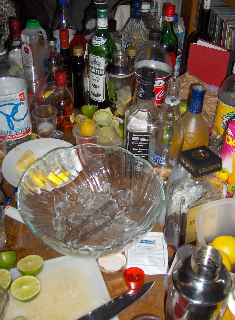
 I'm learning Amharic for my research in Ethiopia. There are over 80 languages spoken in Ethiopia, but Amharic, though a minority language, is the "lingua franca"--as they say. The language is semetic, menaing it is in the same language grouping as Hebrew and Arabic, though it is read from left to right. In the above picture you can see the language. Each letter represents a consonant and vowel. For example, the little girl is pointing at "zhe".
I'm learning Amharic for my research in Ethiopia. There are over 80 languages spoken in Ethiopia, but Amharic, though a minority language, is the "lingua franca"--as they say. The language is semetic, menaing it is in the same language grouping as Hebrew and Arabic, though it is read from left to right. In the above picture you can see the language. Each letter represents a consonant and vowel. For example, the little girl is pointing at "zhe".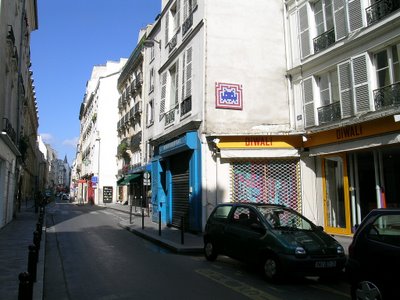 The occasion of Vero's imminent trip to Paris has inspired me to think back to the time I worked as an English teacher in Paris. The photo is of Rue St. Andre des Arts. I lived about 15 seconds away from what the picture displays. At the time, the lovely space invader had yet to, ahem, invade.
The occasion of Vero's imminent trip to Paris has inspired me to think back to the time I worked as an English teacher in Paris. The photo is of Rue St. Andre des Arts. I lived about 15 seconds away from what the picture displays. At the time, the lovely space invader had yet to, ahem, invade.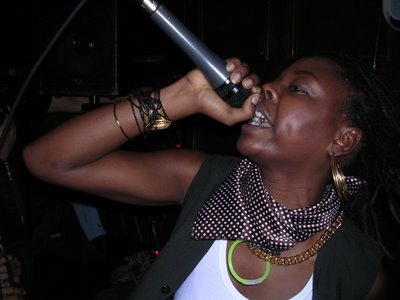 Thuderheist is fun fun fun. I got a big kick out of them a coupla weeks ago--though I did feel a little ancient, knowing that Graham isn't exactly a spring chicken makes me realize that it's all right. As it should be.
Thuderheist is fun fun fun. I got a big kick out of them a coupla weeks ago--though I did feel a little ancient, knowing that Graham isn't exactly a spring chicken makes me realize that it's all right. As it should be. The weather around these parts has been gosh-darned awful. I always find that in Montreal, when it's getting cold, it's hard to imagine that it will ever be warm again. Then, when it's blistering hot, it's near impossible to believe that piles of snow fall on this city every year. In order to keep faith in my Canadian ability to endure seasonal change and to keep myself from falling into seasonal depression, I've taken to thinking about Portmore, Jamaica. Portmore, right next to Kingston, is home to Hellshire Beach, the whitest sand and bluest water I've ever seen. Granted, I don't have much experience with beaches, but, in my mind, it's pretty wonderful. I also wouldn't mind having a freshly cooked fish with bammy and Red Stripe right about now as well.
The weather around these parts has been gosh-darned awful. I always find that in Montreal, when it's getting cold, it's hard to imagine that it will ever be warm again. Then, when it's blistering hot, it's near impossible to believe that piles of snow fall on this city every year. In order to keep faith in my Canadian ability to endure seasonal change and to keep myself from falling into seasonal depression, I've taken to thinking about Portmore, Jamaica. Portmore, right next to Kingston, is home to Hellshire Beach, the whitest sand and bluest water I've ever seen. Granted, I don't have much experience with beaches, but, in my mind, it's pretty wonderful. I also wouldn't mind having a freshly cooked fish with bammy and Red Stripe right about now as well.EM: On your first album you sang a song about the value of education and on this new record there is also a tune that deals with the importance of education. This is clearly a big issue for you.
WK: Jamaica is in a state of turmoil right now, basically because of the lack of educated people and youth. Majority a lot of illiterate people are there. You have big people down there who are in their forties and they can’t read or even write. So it’s easy to resort to crime and violence. If someone is educated, they can reason out and come to some sort of reasoned terms, but someone who is not educated prefers to resort to violence. So this is exactly why they mash up the society. Education, as his majesty teaches us, is the key to betterment and completeness of living in this modern time. So as a servant of his majesty, we emphasize the importance of education, because education brings liberation. It’s good for every nation.
But, if you want a good education in Jamaica you have to have money. A lot of money. I never used to pay school fee, but now the parents have to pay school fee for primary school, basic school. I have a likkle son; me have to pay $6000-7000 Jamaican dollars a month. That’s just a normal, basic school. So you see, most people can’t afford that so it end up that the youths, the parents carry them to go work ‘pon the street side. In Jamaica you see a lot of youths at the stoplight, wiping glasses when they should be in school. You can’t put blame because their parents cannot afford it. They cannot buy books for them, they cannot buy uniform, they cannot pay school fee. They cannot afford the fare to send them to school. Education is the key for any nation’s development. That means education should be free. You haffi consider the poor.
EM: Clearly you feel this on a deeply personal level.
WK: Yes. You see, I had it rough. I was grown by a single parent, my mother. It was very rough, rough. And my mother haffi work, night and day to send me to school. So I didn’t waste time where education is concerned.
EM: You have spoken to youth—especially youth who are interested in the music industry—that it is important to stick with school to have a back up plan.
WK: The more educated you are, the better you are. Because, what I think is that nuff Jamaican artists have the attitude that they have because of illiteracy. They don’t know how to conduct themselves so that give them a bad attitude. Education makes you more rounded so you can deal with the interviews, relate to people more better—all levels of people, whether they come from uptown or downtown, no matter what category they come from.
EM: You’re coming from Portmore—the parish right next to Kingston, Jamaica. There are a number of artists coming from there recently—Gyptian, who won the Portmore talent contest last year and has a huge hit with “Serious Times”, and of course I Wayne. There seems to be a similarity between you and these other artists from Portmore in that you are all very concerned with consciousness. What do you think it is about Portmore that leads to the development of so many strong artists committed to conscious, thoughtful lyrics?
WK: Definitely, definitely, because you know there are many Rastafari in Portmore. So that stimulates the youth to come out with this type of vibe, you know? But at the same time, some youth see the culture and the vibes and they jump on the bandwagon too.
EM: But isn’t it better to jump on the bandwagon of cultural music than to jump on the bandwagon of less positive vibes?
WK: Ahh, definitely. Negativity is bad. But you know Portmore and Jamaica on a whole they have a lot of conscious people there: Bob Marley, the foundation, same way, you know what I mean? Peter Tosh and Dennis Brown and those artists, Luciano, Beres Hammond. They don’t rate violence so people know that positivity is the way.
EM: In terms of Portmore itself, you still live there and give back to the community.
WK: It is very important to remember where you are coming from. Although I was born in the country, in Clarendon, I moved from the country to Portmore. I moved to Kingston in my teenager stage. But it is very important to give back to the community that you are coming from. Cause your roots and your foundation that is. Right now, we come from Waterford and right now we have a youth we’re teaching him the right riddim, his name is Persistence, and he has a single coming out entitled “Foundation.” That’s a way to give back to the community, by helping some of the youths who have the potential too.
EM: Your music is very conscious. Do you think this trend is going to continue in Jamaica?
WK: It is not really continuing, I just speak a positive sound on a record. Whenever you hear that positive music is on the rise, it is always being recorded. It’s the people in the media you see. The media people highlight the vibes. They highlight the slackness and dem highlight the positive, you know what I mean? Positive music has always been recorded in Jamaica. Every since reggae music has been established in Jamaica, but it is the media, sometimes they don’t highlight the positive music but now, we see a lot of people highlighting the positive music which is good, but positive music has always been recorded and done in Jamaica.
EM: You just need to encourage people to pay attention to it.
WK: That is the thing; that is the thing.
EM: It seems that some people don’t like to record political music because of the potential for controversy.
WK: Everyone has the right to speak their mind. So they shouldn’t be afraid to deal with politics. Politics are realistical issues that need to be addressed. Reggae music that come from Bob Marley, it mention social issues. That’s the foundation of reggae music, that’s how it start out. Reggae artists address social issues where political issues are concerned or crime and violence are concerned. The condition of the roads or the condition of the country, definitely.
EM: Your faith obviously means a lot to you and I notice that on the cover of your album you have pictures of one of the carved rock churches in Lalibela, Ethiopia.
WK: Ethiopia gives the world all the religion that the world posseses. The three main religions: Christianity, Judaism and the Muslim faith, all of those religions came out of Ethiopia. So the foundation of the faith, where these religions started was Ethiopia, Africa. That is one of the reasons for highlighting the church. The church that is carved out of rock is a mystery to this day, like the pyramids.
EM: Having been to Ethiopia, I was made aware that the Ethiopian people are very nervous about the Rastafari, because they are very nervous about the use of marijuana.
WK: But not every Rastafarian use marijuana. Smoking marijuana does not make a Rasta. It’s not a rule or a regulation or a law because we have nuff Rastafarian bredren and sistren who do not smoke, who are firm in the faith, who have never smoked from the day they are born.
EM: I think that that is a misconception that many people have—that all Rastas smoke.
WK: The use of herb is a personal thing. It’s for meditation. The herb is not a fashion and style thing, it’s a sacrament for I and I still. In reality, a lot of youths smoke marijuana because they see Bob Marley smoke it in a lot of pictures or they see a lot of Rastafarians smoking herb but me wan fi tell them say: “If you smoke the herb then you have to smoke the herb and think positive.” But don’t smoke the herb or over use it because herb is not something you should abuse, because anything you abuse can be dangerous to your health. If you drink too much water, if you sleep too much, if you have too much sex, if you eat too much, everything that you overdo can be dangerous to you. But there is a balance in everything, you have to reach it.

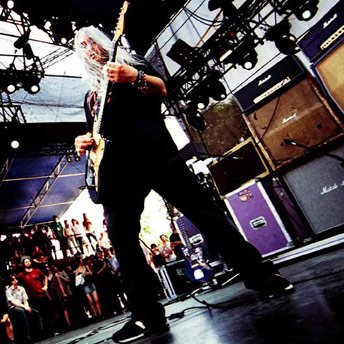
 Photo from cocolinda's flickr. It's what I wish I could focus on in reference to yesterday. Thanks to all who called, concerned for my safety.
Photo from cocolinda's flickr. It's what I wish I could focus on in reference to yesterday. Thanks to all who called, concerned for my safety.

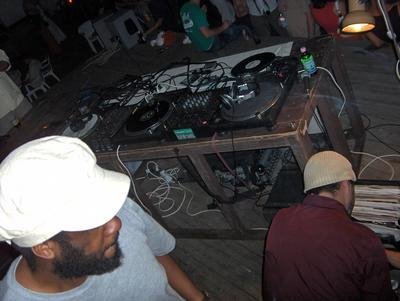 In the above photo, which, admittedly, tends to showcase the turntables more than anything, is Andy Williams at left and Will "Quantic" Holland at right. I just sorta liked the photo-thanks to cratesoul.kepeim.hu. I think I want to go to Hungary now.
In the above photo, which, admittedly, tends to showcase the turntables more than anything, is Andy Williams at left and Will "Quantic" Holland at right. I just sorta liked the photo-thanks to cratesoul.kepeim.hu. I think I want to go to Hungary now. Here's a photo of me giving a speech in Amharic--the second speech I've made in the language. It appears from the photo, taken by Heather (there's a link to her blog at left), that either the content of the speech or my brutal pronounciation is particularly hilarious. All this to say that I think it's pretty indicative of something...
Here's a photo of me giving a speech in Amharic--the second speech I've made in the language. It appears from the photo, taken by Heather (there's a link to her blog at left), that either the content of the speech or my brutal pronounciation is particularly hilarious. All this to say that I think it's pretty indicative of something...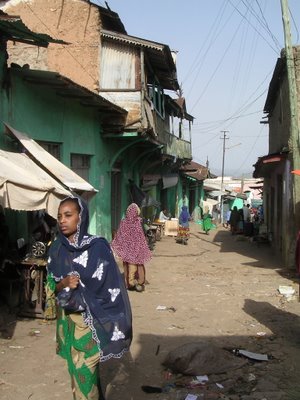


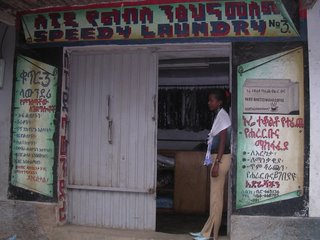


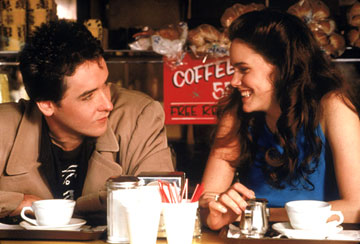
 In addition to trying to blog a little more and updating this whole situation so it's more of a website type thing (really it's because I'm desperately jealous of Vero--check her new site and you will be too) that makes the attempt to dispaly my saleable talents. Before all that, however, it's getting to the time when I can start watching Coronation Street again. I've been neglecting the show on CBC ever since I started downloading and watching the future. The show, for those of you yet-converts, is a brillant Brit-soap that we in Canada, regardless of the fact that we live in a world with the capacity to instantly email videos of explosions, are forced to watch shows broadcast in the UK nearly nine months ago. I made the mistake--seriously, it didn't seem that way at the time, but that's because one episode is a gateway drug into obsession--of indulging my desire for the future and it has since ruined me for present day life on the street. I think, taking it day by day, I have only a few short weeks and I'll be fully back on the wagon. And then, please leave me in the dark about the goings-on with Gail, Fred, Tracey, Charlie, Ashley, Vera, Roy, Hayley and the gang...I think it's better for my mental health that way.
In addition to trying to blog a little more and updating this whole situation so it's more of a website type thing (really it's because I'm desperately jealous of Vero--check her new site and you will be too) that makes the attempt to dispaly my saleable talents. Before all that, however, it's getting to the time when I can start watching Coronation Street again. I've been neglecting the show on CBC ever since I started downloading and watching the future. The show, for those of you yet-converts, is a brillant Brit-soap that we in Canada, regardless of the fact that we live in a world with the capacity to instantly email videos of explosions, are forced to watch shows broadcast in the UK nearly nine months ago. I made the mistake--seriously, it didn't seem that way at the time, but that's because one episode is a gateway drug into obsession--of indulging my desire for the future and it has since ruined me for present day life on the street. I think, taking it day by day, I have only a few short weeks and I'll be fully back on the wagon. And then, please leave me in the dark about the goings-on with Gail, Fred, Tracey, Charlie, Ashley, Vera, Roy, Hayley and the gang...I think it's better for my mental health that way.


 I tend to read the blog Meskel Square quite a bit. It's by British journalist Andrew Heavens, who happens to live and report from Addis Ababa. In recent weeks, Heavens (who is also a pretty incredible photographer btw-check the picture of a child in Harar that accompanies this entry) has blogged about how the Ethiopian government is censoring the internet. Numerous blogs, in fact all that utilize the Blogger platform, are inaccesible from within the country. There goes my idea to write about my trip while in Shashemene next month...
I tend to read the blog Meskel Square quite a bit. It's by British journalist Andrew Heavens, who happens to live and report from Addis Ababa. In recent weeks, Heavens (who is also a pretty incredible photographer btw-check the picture of a child in Harar that accompanies this entry) has blogged about how the Ethiopian government is censoring the internet. Numerous blogs, in fact all that utilize the Blogger platform, are inaccesible from within the country. There goes my idea to write about my trip while in Shashemene next month... Here's a little extended version of a piece I wrote for FlowTV. It is, admittedly, quite snarky, but I do like my description of Freaks and Geeks. Though I wrote this a couple of years ago, my love for that show has not abated. I would, however, like to know if there's any tv-obsessed folk out there who know if there's been any writing on the tv-on-dvd phenomenon. I'm a little behind on my tv-crit...
Here's a little extended version of a piece I wrote for FlowTV. It is, admittedly, quite snarky, but I do like my description of Freaks and Geeks. Though I wrote this a couple of years ago, my love for that show has not abated. I would, however, like to know if there's any tv-obsessed folk out there who know if there's been any writing on the tv-on-dvd phenomenon. I'm a little behind on my tv-crit...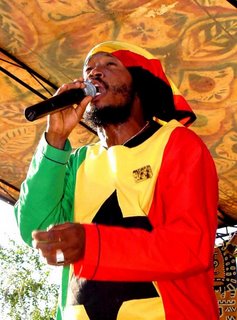 Here's a little something I forgot to post a while ago.
Here's a little something I forgot to post a while ago.